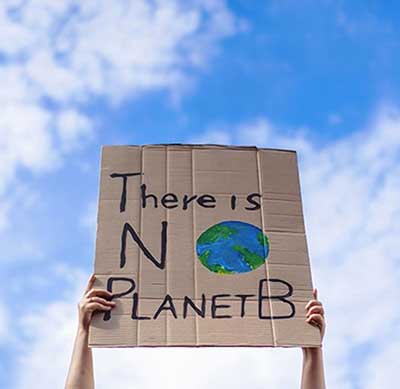Relevance: GS-3: Environment, Security and Disaster Management
Key Phrases: Working Group III, per capita emissions, UNFCCC, CBDR, GHG, Paris Agreement target, socio-cultural aspects.
Why in News?
- The report from IPCC’s working group 3 paints a sobering picture of the state of responses to climate change - which, as the report notes with some dismay – are falling far short in scale and speed of what is needed.
Background:
- The report reminds us in stark and quantitative terms that the roots of today’s climate crisis are firmly anchored in inequitable patterns of development and consumption.
- Developed countries are the source of 58 per cent of all greenhouse gases emitted by humans since 1850, the report says, while the least developed countries account for just 0.4 per cent of total planet-warming pollution.
- Today, 41 per cent of the global population lives in countries with per capita emissions less than half the global average of 6 t-CO2eq/cap.
- If currently there are only eight years of carbon budget left (to meet the 1.5 C target); that is because historically the developed parts of the world have borrowed far more than their fair share.
- Scientific evidence and UNFCCC recognised - the principle of common but differentiated responsibility or CBDR — are echoing the same fairness principle to serve the basis for climate action and for the developed world to acknowledge and act without losing time to return the carbon debt in favour of the growing world.
About Working Group 3 REPORT
- The Working Group III report provides an updated global assessment of climate change mitigation progress and pledges, and examines the sources of global emissions.
- It explains developments in emission reduction and mitigation efforts, assessing the impact of national climate pledges in relation to long-term emissions goals.
- Working Group III introduces several new components in its latest report: One is a new chapter on the social aspects of mitigation, which explores the ‘demand side’, i.e. what drives consumption and greenhouse gas emissions.
Inequity: Between and Within Nations
- Inequity: Inequity is not only between countries; it is within countries, it extends to our individual responsibility and lifestyle choices though these choices are often shaped and constrained by the characteristics of the system and existing policies, infrastructure and technologies and critically therefore to our lifestyle choices.
- Lifestyles and the Role of Values: In a paradigm shift from the past, the IPCC WG 3 report focuses attention on the issue of lifestyles and the role of values, preferences and consumer choices and structural lock-ins that shape demand in driving emissions.
- Luxury vs Survival: The debate regarding “luxury” vs “survival” emissions is not academic — it has real-world implications for achieving a more sustainable — and just and equitable future.
- Demands Cooperation: The WG 3 report reminds us that climate change is the epitome of a collective action problem that demands cooperation — within and among countries, and between the public and private sectors. Cooperation that is not charity or a handout; but genuine cooperation to return the historical carbon debt based on equitable burden-sharing.
Key Concerns:
- 10 per cent of households:
- Globally, the 10 per cent of households with the highest per capita emissions contribute 34-45 per cent of global consumption-based household GHG emissions and the bottom 50 per cent contribute just 13-15 per cent.
- Slow financial flows:
- Progress on the alignment of financial flows towards the goals of the Paris Agreement remains slow and the actual mobilisation of public and private finance falls far below the Paris Agreement target of $100 billion annually by 2020.
- Shifting goal-posts:
- Unfortunately, as the report had to admit, the story here is a story of broken promises and shifting goal-posts.
- Slow Progress:
- Despite recognition of its importance and the availability of technically feasible and cost-effective options (Mitigation options costing $100 tCO2-eq-1 or less could reduce global GHG emissions by at least half the 2019 level by 2030) progress is halting and slow.
- Lack of political will:
- The lack of political will is identified as the culprit behind the slow progress.
The Intergovernmental Panel on Climate Change(IPCC)
- The IPCC prepares comprehensive Assessment Reports about the state of scientific, technical and socio-economic knowledge on climate change, its impacts and future risks, and options for reducing the rate at which climate change is taking place.
- It also produces Special Reports on topics agreed to by its member governments, as well as Methodology Reports that provide guidelines for the preparation of greenhouse gas inventories.
- The main activity of the IPCC is the preparation of reports assessing the state of knowledge of climate change.
- These include assessment reports, special reports and methodology reports. To deliver this work programme, the IPCC holds meetings of its government representatives, convening as plenary sessions of the Panel or IPCC Working Groups to approve, adopt and accept reports.
Conclusion:
- To save the climate, we need to shift from conventional climate policy - moving from an exclusive focus on mitigation to a broader enabling condition creation for low carbon lifestyle and development approach.
- More emphasis needs to be given on the larger deep rooted socio-cultural aspects, innovation and economic policy goals of high immediacy and political salience; while at the same time reaping simultaneous climate benefits of both adaptation and mitigation and not one over the other.
Sources: The Hindu BL
Mains Question:
Q. Briefly discuss the core message of the IPCC Working Group 3 report. Suggest measures to mitigate climate change. (250 words).








